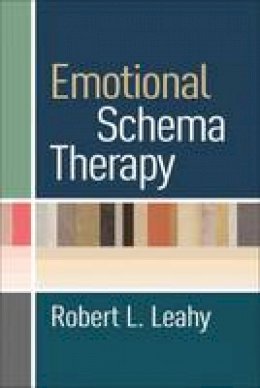
Stock image for illustration purposes only - book cover, edition or condition may vary.
Emotional Schema Therapy
Robert L. Leahy
FREE Delivery in Ireland
Description for Emotional Schema Therapy
Hardback. Num Pages: 384 pages. BIC Classification: JMQ; MMJT. Category: (G) General (US: Trade); (U) Tertiary Education (US: College). Dimension: 237 x 162 x 36. Weight in Grams: 686.
This book presents innovative tools for helping patients to understand their emotional schemas--such as the conviction that painful feelings are unbearable, shameful, or will last indefinitely--and develop new ways of accepting and coping with affective experience. Therapists can integrate emotional schema therapy into the treatment approaches they already use to add a vital new dimension to their work. Rich case material illustrates applications for a wide range of clinical problems; assessment guidelines and sample worksheets and forms further enhance the book's utility.
Product Details
Publisher
Guilford Publications
Place of Publication
New York, United States
Shipping Time
Usually ships in 4 to 8 working days
About Robert L. Leahy
Robert L. Leahy, PhD, is Director of the American Institute for Cognitive Therapy in New York and Clinical Professor of Psychology in the Department of Psychiatry at Weill Cornell Medical College. His research focuses on individual differences in emotion regulation. Dr. Leahy is Associate Editor of the International Journal of Cognitive Therapy and is past president of the Association for ... Read moreBehavioral and Cognitive Therapies, the International Association for Cognitive Psychotherapy, and the Academy of Cognitive Therapy. He is the 2014 recipient of the Aaron T. Beck Award from the Academy of Cognitive Therapy. Dr. Leahy has published numerous books, including, most recently, the coauthored volumes Treatment Plans and Interventions for Bulimia and Binge-Eating Disorder; Treatment Plans and Interventions for Depression and Anxiety Disorders, Second Edition; and Emotion Regulation in Psychotherapy. Show Less
Reviews for Emotional Schema Therapy
Leahy offers a version of cognitive therapy that richly embraces emotion and addresses it with nuance and respect. This is not your grandmother's cognitive therapy. I learned much from this book and am confident that other readers from outside the cognitive therapy world will as well.
Paul L. Wachtel, PhD, Colin Powell School for Civic and Global Leadership, The City ... Read moreCollege of New York, and Doctoral Program in Clinical Psychology, The Graduate Center, The City University of New York This book extends the practice of cognitive therapy to include a most important and clinically relevant focus on the role of emotion in the change process. Drawing on empirical evidence and clinical experience, Leahy has captured a truly evidence-based approach to treatment. The book is unlike many others in presenting clinical guidelines that not only draw on different theoretical orientations, but also integrate research and practice. Vividly illustrated with clinical vignettes and transcripts, this volume offers insights for any and all therapists looking to increase their clinical effectiveness.
Marvin R. Goldfried, PhD, Distinguished Professor of Psychology, Stony Brook University This straightforward book is highly informative and compelling. Leahy has a unique ability to convey the phenomena of the human condition. He suggests practical and useful techniques to help clients identify, validate, and respond effectively to their emotions. A particular strength is the focus on specific emotional contexts and experiences that clients typically bring to therapy. An essential text for teaching diverse groups of trainees about the importance of working with emotions in therapy and how best to do so.
Douglas S. Mennin, PhD, Department of Psychology, Hunter College and the Graduate Center of the City University of New York Although primarily focusing on thoughts and behaviors
as we are trained to do in CBT
is appropriate and effective for many clients, others present for treatment with problematic responses to their own and others' emotions. This wonderful book clearly outlines the role that emotion plays in psychological disorders and shows how to work with emotions throughout the course of therapy to help patients improve their relationships, learn how to make important decisions, and cope with life's inevitable challenges. Helpful case examples, scripts, and assessment guidelines make the book even more user friendly. I am already using what I learned from this book in my daily work. That rarely happens!
Deborah Roth Ledley, PhD, private practice, Plymouth Meeting and Narberth, Pennsylvania Highly accessible and filled with illustrative clinical case examples, this book is a valuable resource for any modern psychotherapist. The volume provides practical guidance to target emotional schemas in therapy. It is a masterful contribution by one of the leading experts in CBT. Every clinician should be familiar with the techniques outlined in this excellent work.
Stefan G. Hofmann, PhD, Department of Psychology, Boston University There are very few teachers, scholars, and practitioners who understand the strengths and weaknesses of contemporary CBT as well as Leahy. His writings are at once edifying, useful, and easily understood. His works should be part of the clinical reference library of every clinician, regardless of orientation. This text is multilayered. For the sophisticated clinician, it offers insights into the essential nature and role of the emotional schema in the milieu and the therapeutic process. For the novice therapist, the text offers a solid introduction and running start into CBT.
Arthur Freeman, EdD, LLD (h. c.), ABPP, Professor Emeritus of Psychology, Philadelphia College of Osteopathic Medicine This important book illuminates how an individual's theory of emotion, emotion-regulation strategies, and meta-emotions influence well-being and experience. The contribution Leahy makes could be quite profound, as his ideas and clinical experience bridge the areas of emotional intelligence, cognition, self-regulation, and the practice of psychological therapies. Clinicians working in all orientations will find this volume a source of invaluable ideas.
Adrian Wells, PhD, School of Psychological Sciences, University of Manchester, United Kingdom Show Less

